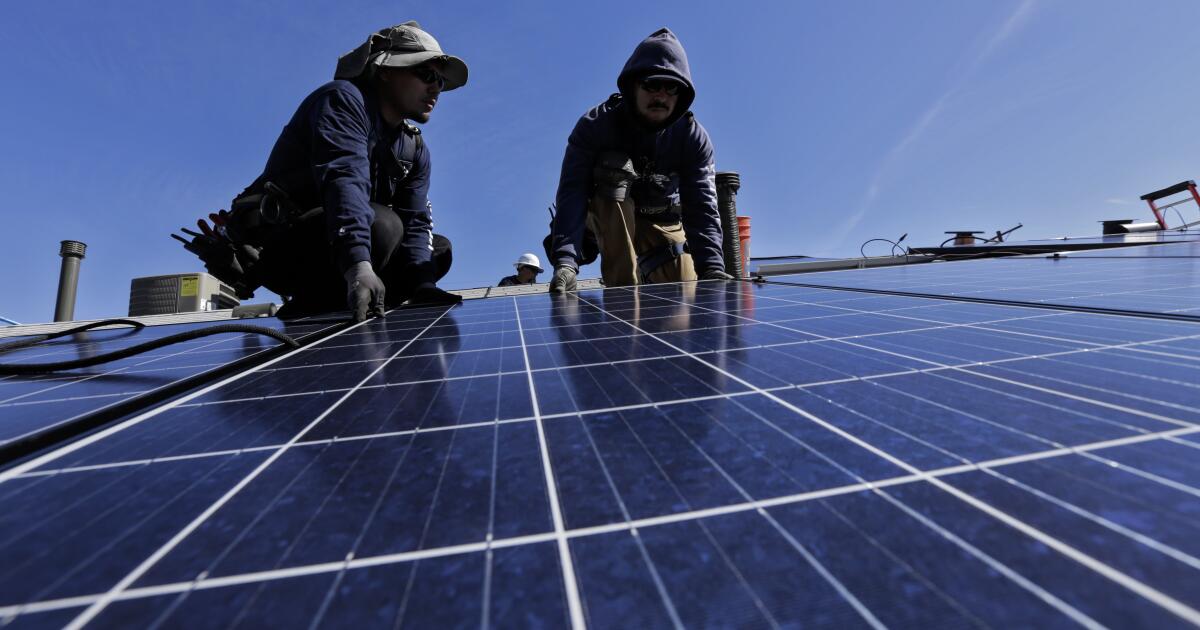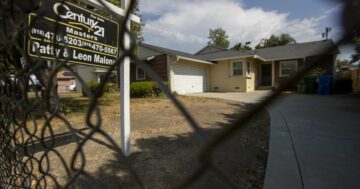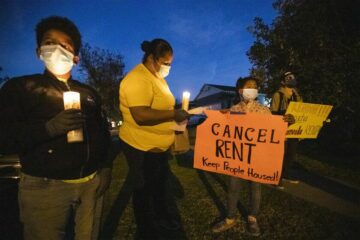
Los Angeles County has agreed to a $12-million settlement to resolve allegations that its home improvement lending program wrecked the finances of many borrowers and left them vulnerable to foreclosure.
The settlement, granted preliminary approval Monday by an L.A. County Superior Court judge, comes six years after some homeowners sued the county in twin suits alleging that local officials knew, or should have known, the program would harm vulnerable homeowners and then looked the other way as problems piled up.
The county did not admit wrongdoing as part of the settlement and continued to deny the allegations. It said it settled to avoid further litigation costs.
“Without this, I think people would stand to get absolutely nothing,” said Stephanie Carroll, an attorney with Public Counsel, which along with Bet Tzedek and Hogan Lovells represented homeowners in the two lawsuits. “Now they stand to get some compensation for what happened to them.”
Launched in 2015, the county’s Property Assessed Clean Energy, or PACE, program had the stated goal of enabling homeowners to finance energy- and water-efficient home improvements, including solar panels and low-flow toilets.
The program, a public-private partnership, was overseen by the county but largely operated and funded by private finance companies, which in turn relied on home improvement contractors to sign up borrowers.
Other PACE programs have been set up across the country. The loans require government approval because they are repaid as a line item on a homeowner’s property tax bill.
PACE programs, including L.A. County’s, have been dogged by allegations that consumers — particularly elderly and non-English-speaking homeowners — didn’t understand what they were getting into and couldn’t afford their loans, which, if unpaid, could lead to foreclosure.
Initially, lenders handed out loans based on the amount of equity a homeowner had in their property and didn’t consider the borrower‘s income to determine if they could repay the loan.
Contractors who signed borrowers up for the loans have been accused of misleading consumers on how they would work.
It wasn’t until 2018, following passage of state reform legislation, that lenders in California had to conduct an ability-to-repay analysis based on income.
Still, complaints from homeowners continued, including that home improvement contractors charged inflated costs and forged their signatures to get the loans processed.
In 2020, L.A. County shut down its program in part, it said, because it could not be sure there were sufficient protections for consumers.
PACE companies say the vast majority of their customers come away happy and that foreclosures are rare. Some firms have blamed new California consumer protection rules for knocking out too many qualified candidates.
The settlement, preliminarily approved Monday, resolves two lawsuits filed against the county and two of its private lender partners, Renew Financial and Renovate America. The suits allege that the parties committed financial elder abuse and that the private lenders encouraged predatory lending by not considering a consumer’s ability to repay while telling contractors how much of a loan a consumer qualified for based on their home equity.
Like the county, Renew Financial continued to deny allegations as part of the settlement. Renovate America has since gone out of business, but previously said it found “no merit” in the allegations.
Under the terms of the settlement, the county will pay $9 million, while Renew Financial will pay $3 million. The amount for attorney and administrative fees will be capped at $2 million, with the rest going to homeowners.
Consumers can receive money if they took out a Renew Financial or Renovate America loan through the county program from March 1, 2015, to March 31, 2018.
The county partnered with a third lender as part of the program, PACE Funding Group, which was not a party to the suits and homeowners with those loans are not entitled to relief.
Homeowners who are eligible will receive extra compensation if their PACE loans caused very large debt burdens. In addition, those with big debt burdens who at the time of origination were 65 and older or had limited English proficiency will receive even more money.
“For those people who particularly were kind of victimized … I think it will be very significant,” said Michael Maddigan, an attorney with Hogan Lovells.
Though L.A. County no longer offers a PACE program, PACE loans remain available to many county residents because their cities —including Los Angeles — allow PACE financing through statewide programs.
Homeowners who took out loans through those programs are not part of the settlement and not entitled to relief — even if their loan came from Renew Financial or Renovate America.
Eligible homeowners will receive written notification of the settlement by mail.
L.A. County Supervisor Hilda Solis said that the county remains committed to servicing PACE loans taken out under its program before it closed, as well as improving protections for those consumers.
“The settlement demonstrates that commitment and our support for homeowners who sought to improve the energy and water efficiency of their homes under the program,” Solis said in a statement.
For Zenia Ocana, the prospect of help is welcome news.
In 2016, Ocana and her husband Juan decided to get solar panels on their North Hollywood home and ended up with a Renew Financial loan through the county’s program that left them with no residual income to live on, according to a complaint in one of the settling suits.
In an interview, Ocana, 54, said the contractor who signed them up for the loan told them the solar panels would be paid for by the government and cost her family nothing.
The Ocanas received no documents in Spanish from Renew Financial even though they don’t understand complex documents in English and were charged nearly three times the normal rate for solar panels, the lawsuit alleged.
To afford the nearly $4,500 in annual loan payments, Ocana said she and her husband have cut back on food, relied on help from family and delayed other bills.
The settlement, Ocana said, provides her hope that “we can be free of this nightmare.”
- SEO Powered Content & PR Distribution. Get Amplified Today.
- PlatoData.Network Vertical Generative Ai. Empower Yourself. Access Here.
- PlatoAiStream. Web3 Intelligence. Knowledge Amplified. Access Here.
- PlatoESG. Carbon, CleanTech, Energy, Environment, Solar, Waste Management. Access Here.
- PlatoHealth. Biotech and Clinical Trials Intelligence. Access Here.
- Source: https://www.latimes.com/california/story/2024-03-26/l-a-county-settles-pace-loan-lawsuits-affected-home-owners-to-receive-millions
- :has
- :is
- :not
- $3
- $9 million
- $UP
- 1
- 2015
- 2016
- 2018
- 2020
- 31
- 500
- 54
- 65
- a
- ability
- absolutely
- abuse
- According
- accused
- across
- addition
- administrative
- admit
- affected
- afford
- After
- against
- agreed
- Allegations
- alleged
- allow
- along
- america
- amount
- an
- analysis
- and
- Angeles
- annual
- approval
- approved
- ARE
- AS
- assessed
- At
- attorney
- available
- avoid
- away
- back
- based
- BE
- because
- been
- before
- Bet
- Big
- Bill
- Bills
- borrowers
- business
- but
- by
- california
- came
- CAN
- capped
- caused
- charged
- Cities
- clean
- clean energy
- closed
- come
- comes
- commitment
- committed
- Companies
- Compensation
- complaint
- complaints
- complex
- Conduct
- Consider
- considering
- consumer
- Consumer Protection
- Consumers
- continued
- Contractor
- contractors
- Cost
- Costs
- could
- counsel
- country
- county
- Court
- Customers
- Cut
- Debt
- decided
- Delayed
- demonstrates
- Determine
- DID
- documents
- Dont
- down
- efficiency
- elder
- Elderly
- eligible
- enabling
- encouraged
- ended
- energy
- English
- entitled
- equity
- Even
- extra
- family
- Fees
- filed
- finance
- Finances
- financial
- financing
- firms
- following
- food
- For
- For Consumers
- found
- Free
- from
- funded
- funding
- further
- get
- getting
- goal
- going
- gone
- Government
- granted
- Group
- had
- happened
- happy
- harm
- Have
- help
- her
- Hollywood
- Home
- Homes
- hope
- How
- HTML
- HTTPS
- i
- if
- improve
- improvement
- improvements
- improving
- in
- Including
- Income
- Interview
- into
- IT
- ITS
- jpg
- juan
- judge
- Kind
- knew
- Knocking
- known
- large
- largely
- lawsuit
- Lawsuits
- lead
- left
- lender
- lenders
- lending
- Limited
- Line
- LINK
- Litigation
- live
- loan
- Loans
- local
- longer
- looked
- los
- Los Angeles
- Majority
- many
- March
- March 1
- Michael
- million
- millions
- misleading
- Monday
- money
- more
- much
- nearly
- New
- news
- no
- normal
- North
- nothing
- notification
- of
- officials
- older
- on
- ONE
- operated
- or
- origination
- Other
- our
- out
- Pace
- paid
- panels
- part
- particularly
- parties
- partnered
- partners
- Partnership
- party
- passage
- Pay
- payments
- People
- plato
- Plato Data Intelligence
- PlatoData
- predatory
- preliminary
- previously
- private
- problems
- processed
- Program
- Programs
- property
- prospect
- protection
- provides
- public
- qualified
- RARE
- Rate
- receive
- received
- reform
- relief
- remain
- remains
- repay
- represented
- require
- residents
- resolve
- resolves
- REST
- rules
- Said
- say
- servicing
- set
- Settled
- settlement
- settles
- settling
- she
- should
- shut
- Shut down
- sign
- signed
- significant
- since
- SIX
- solar
- solar panels
- some
- sought
- Spanish
- stand
- stated
- Statement
- sufficient
- suits
- superior
- support
- sure
- taken
- tax
- telling
- terms
- that
- The
- their
- Them
- then
- There.
- they
- Think
- Third
- this
- those
- though?
- three
- Through
- time
- times
- to
- told
- too
- took
- TURN
- twin
- two
- under
- understand
- until
- Vast
- very
- Vulnerable
- was
- Water
- Way..
- welcome
- WELL
- were
- What
- which
- while
- WHO
- will
- with
- Work
- would
- written
- years
- zephyrnet












